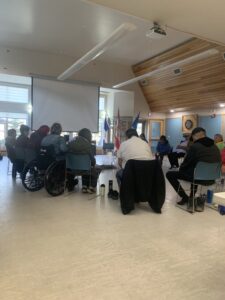As part of the ongoing effort to help the victims of residential schools on their journeys of recovery, the Northwest Territories/Nunavut Council of Friendship Centres recently partnered with the Shakes the Dust Hope Consulting group to hold two special sessions of Traditional Healing Ceremonies.
The Ceremonies were lead by Frank and Beverly Hope, who have been running their business since 2013.
“The way that we formed our business was a natural transition from when me and my wife Bev were working with the Healing Drum Society and the Healing Drum Society had the last of the Aboriginal Healing Foundation funds for healing initiatives, and we were delivering one month trauma recovery programs in communities throughout the Northwest Territories, and when that funding ended, it was just natural transition for us to continue that work.”
Frank was kind enough to share the general healing process that he and Beverly have employed over the years. The residential school Survivor from Łı́ı́dlı̨ı̨ Kų́ę́ (Fort Simpson) explained that they use a “layering process” and go through the exercises over and over again.
“So much of the losses we’ve experienced are a result of the colonization of our traditions, ceremonies, and customs, so that’s where we start. We begin the day with our ceremonies, and then we move onto the teachings, and blend them together throughout the program.”
Their most recent sessions took place at the Explorer Hotel in Yellowknife over two days, and as Frank explained, served as an impromptu “ceremonial closure to this particular program that the Indian Residential Schools Commemoration Program that the Friendship Centres of the Northwest Territories were very successful in funding for the last seven years. That funding has ended, so that means the closure of this particular program.”

A healing ceremony for survivors of residential schools.
(Photo provided by Maxine Lacorne, NT/NU Council of Friendship Centres)
The importance of programs such as these was very strongly expressed by one of the session’s participants, Karen Felker.
“A process like this needs to keep going. It helps us find the strength within us to have to go through what we’ve suffered. Our grandparents, our mothers, a lot of us are still walking in that, and workshops like this bring us back to who we are, and helps us remember where we come from. We come from unconditional love, and that kind of love doesn’t see race. It is pure.
“The Elders who have walked before us have left us many messages that we need to pick up, and Frank and Bev are bringing them back to us. That’s something that belongs to us as Dene people, and as humans.”
These sentiments were echoed by another participant, Peter Huskey.
“Being a participant in this kind of a setting helps us to work through our problems and in recognizing that it’s not only us that go through that kind of stuff, but through the group, we understand and help one another work through the traumas that we endured.”
Huskey also shared a sense of hope that he feels for the future, as Canada’s new Prime Minister, Mark Carney, was born in Fort Smith, and is now joined in Parliament by former Yellowknife Mayor, Rebecca Alty, who was recently elected as the MP for the Northwest Territories.
Huskey feels that with two prominent figures in Canada’s government with strong ties to the NWT, more attention will be given to the issues of Indigenous peoples across the country, and more prominent actions will be taken.
Finally, Frank Hope shared a message to those who have no personal or familial history with residential schools.
“It’s a very important topic, as difficult as it is to have that conversation. It’s not just with Indigenous people in Canada, but it involves all of us as Canadians, too, to keep building those bridges and that understanding.
“We’ve done many workshops over the years, and when we deliver presentations to non-Indigenous people, it’s often very receptive. Most people will say “Well how can I help? How can I be an ally to this process?” and again, it’s just keeping this conversation going.”





